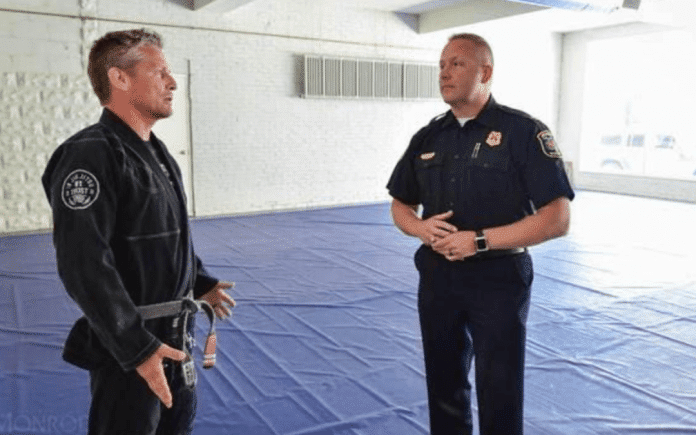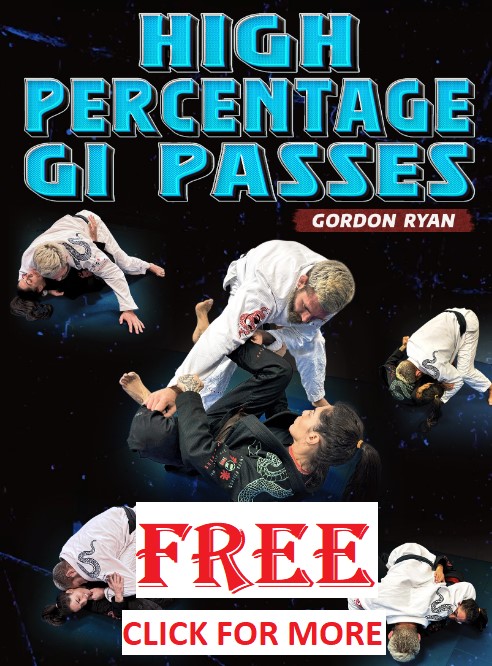
With the spotlight being so heavy on police departments after the outrage pressed by people over police brutality, more and more departments are thankfully starting to see that their officers need more training in how to subdue and deescalate situations. Not only to protect civilians but also to protect themselves from potential harm.
Many police chiefs, including Lynnwood Police department’s Chief Jim Nelson, said yesterday that training plays a major role in law enforcement, however, officers don’t get nearly enough of it. After going through the police academy training diminishes significantly and as anyone reading might know it’s a perishable skill.
Yesterday Lynnwood, Washington’s Police Department made it mandatory for officers to take BJJ lessons every month for the next two years. This can seriously help officers and benefit the public because when more officers know how to control and subdue a suspect the use of deadly force will go down.
How does BJJ reduce deadly force?
There is an old saying that says, “if all you have in your tool belt is a hammer, everything looks like a nail”. In other words, if a police officer’s only tool for defusing a tense situation is pulling out his or her firearm then someone will most likely get shot.
Even the notorious situation involving the now infamous killing of George Floyd could have been avoided if the officer involved understood how “blood chokes” work. I will not get into the politics involved in this case, this is just to illustrate how the training of BJJ can help reduce the number of civilian casualties.
Often we also forget those police officers are also people involved in a very dangerous and demanding job. If you put anyone in a situation where they need to deal with aggression and all they have is a gun with little to no training, most people would be consumed with fear. And when we are scared our brain can literally not come up with the best solutions, it is just going on instinct.
There was also a video of six officers trying to take down and control two people at a subway station and failing at it. It turned into a huge scuffle that lasted for over 25 minutes before they were finally able to control them, putting many people in danger. It blew my mind when I saw it but this is what happens when police officers do not have the necessary training to do their job.
On the other hand, there are also hundreds of videos going around the internet of civilians who train BJJ taking down criminals for the police to take into custody. It would be better if police officers already had these skills by themselves.
Why BJJ specifically?
Many have asked if BJJ is the best option for law enforcement and if there might be another option that is more suited for this type of real-world application outside of sport. The concern is that going to the ground may be dangerous for an officer especially if the suspect might be armed and that a martial art without an emphasis on striking like BJJ might be unsafe for law enforcement.
This is a legitimate concern.
However as former Navy Seal officer and BJJ black belt Jocko Willink once put it; “when you’re trying to safely control someone who is resisting, hitting them will not make them comply and it will injure them. If the option is there to control a person without harming them you should always take that route.”
Police officers need to always try to protect themselves but also if at all possible, do it in such a way that doesn’t put anyone else in danger and BJJ gives officers that option.
Will all police departments implement BJJ training?
Most departments recommend it but very few actually mandate it, right now there are several police departments in the US and other countries that have started mandating regular BJJ classes for their officers but it is still nowhere where it needs to be in order to increase the effectiveness of officers and reduce the dangers related to the job.
The best you can do as a BJJ practitioner for your community is to either offer
classes to officers in your area, work with your local police department, or direct
them to your instructor or BJJ gym.
Some police departments are still resisting the idea of training their officers for monetary reasons or for fear that their officers might get injured in training. However, it’s up to us to assure them that the benefits far outweigh the costs.


![Darce Choke Encyclopedia – Origins, Mechanics and Variations [2024] BJJ, choke, Brabo, BJJ Darce Choke, D'arce Choke, Darce BJJ Choke](https://bjj-world.com/wp-content/uploads/2017/11/JungPoirierLeeYahoo-218x150.jpg)











![Mastering Control From Top Position Trent Hidlay DVD Review [2024] Mastering Control From Top Position Trent Hidlay DVD Review](https://bjj-world.com/wp-content/uploads/2024/11/control-from-top-position-trent-hidlay-dvd-review-218x150.png)
![Foot Sweep the World Dainis Nguyen-Huu DVD Review [2024] Foot Sweep the World Dainis Nguyen-Huu DVD Review](https://bjj-world.com/wp-content/uploads/2024/11/foot-sweep-the-world-dainis-nguyen-huu-dvd-review-218x150.png)
![Front Headlock and Turtle Escapes Brian Glick DVD Review [2024] Front Headlock and Turtle Escapes Brian Glick DVD Review](https://bjj-world.com/wp-content/uploads/2024/11/headlock-and-turtle-escapes-brian-glick-dvd-review-218x150.png)
![Basic Closed Guard Jasmine Rocha DVD Review [2024] Basic Closed Guard Jasmine Rocha DVD Review](https://bjj-world.com/wp-content/uploads/2024/11/basic-closed-guard-jasmine-rocha-dvd-review-218x150.png)


![Total Domination Top Control Mariusz Domasat DVD Review [2024] Total Domination Top Control Mariusz Domasat DVD Review](https://bjj-world.com/wp-content/uploads/2024/09/domination-top-control-mariusz-domasat-dvd-review-100x70.png)


![Henry Akins Black Hole No-Gi Closed Guard DVD Review [2024] Henry Akins Black Hole No-Gi Closed Guard DVD Review](https://bjj-world.com/wp-content/uploads/2024/09/henry-akins-black-hole-no-gi-closed-guard-dvd-review-100x70.png)

![Jett Thompson Master Ankle and Aoki Lock DVD Review [2024] Jett Thompson Master Ankle and Aoki Lock DVD Review](https://bjj-world.com/wp-content/uploads/2024/09/jett-thompson-master-ankle-and-aoki-lock-dvd-review-100x70.png)
![Dynamic Headquarters Passing Jason Rau DVD Review [2024] Dynamic Headquarters Passing Jason Rau DVD Review](https://bjj-world.com/wp-content/uploads/2024/10/dynamic-headquarters-passing-jason-rau-dvd-review-100x70.png)

![No-Gi Pressure Mastery JT Torres DVD Review [2024] No-Gi Pressure Mastery JT Torres DVD Review](https://bjj-world.com/wp-content/uploads/2024/10/no-gi-pressure-mastery-jt-torres-dvd-review-100x70.png)



![Simplify the System Side Scissor Brian Glick DVD Review [2024] Simplify the System Side Scissor Brian Glick DVD Review](https://bjj-world.com/wp-content/uploads/2024/09/side-scissor-brian-glick-dvd-review-2024-100x70.png)

![Old School BJJ Ricardo Cavalcanti Fundamentals DVD Review [2024] Old School BJJ Ricardo Cavalcanti Fundamentals DVD Review](https://bjj-world.com/wp-content/uploads/2024/09/old-school-bjj-ricardo-cavalcanti-dvd-preview-100x70.png)



![Tiny Woman Guide To The Guard Ann Kneib DVD Review [2024] Tiny Woman Guide To The Guard Ann Kneib DVD Review](https://bjj-world.com/wp-content/uploads/2024/11/tiny-woman-guide-to-the-guard-ann-kneib-dvd-review-100x70.png)



![Efficiently Executing X-Guard Giancarlo Bodoni DVD Review [2024] Efficiently Executing X-Guard Giancarlo Bodoni DVD Review](https://bjj-world.com/wp-content/uploads/2024/09/efficiently-executing-x-guard-giancarlo-bodoni-dvd-REVIEW-100x70.png)
![Front Headlock and Turtle Escapes Brian Glick DVD Review [2024] Front Headlock and Turtle Escapes Brian Glick DVD Review](https://bjj-world.com/wp-content/uploads/2024/11/headlock-and-turtle-escapes-brian-glick-dvd-review-100x70.png)

![Nicholas Meregali No-Gi System DVD Unpacked: A Detailed Review [2024] Nicholas Meregali No-Gi System DVD Unpacked: A Detailed Review](https://bjj-world.com/wp-content/uploads/2024/09/nicholas-meregali-no-gi-system-dvd-unpacked-review-100x70.png)